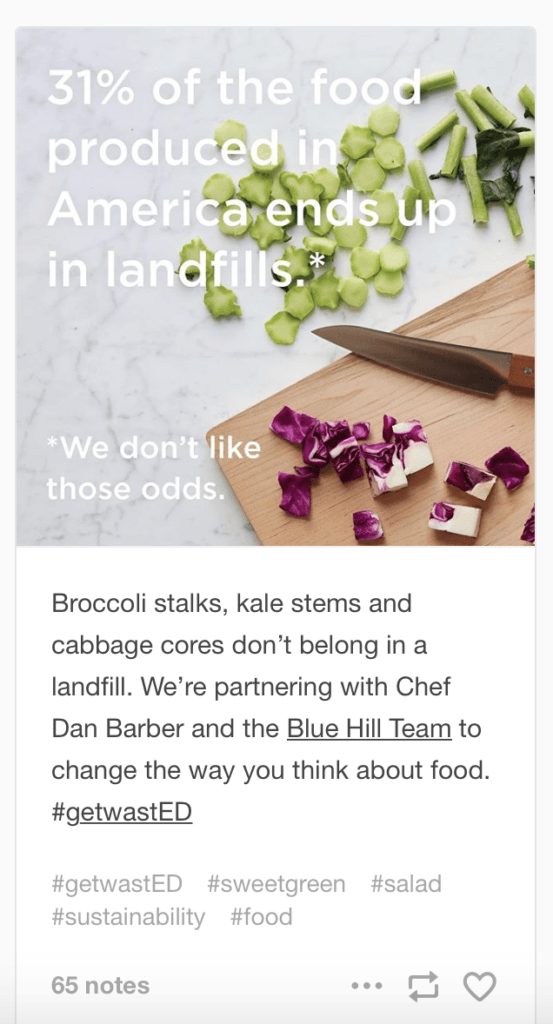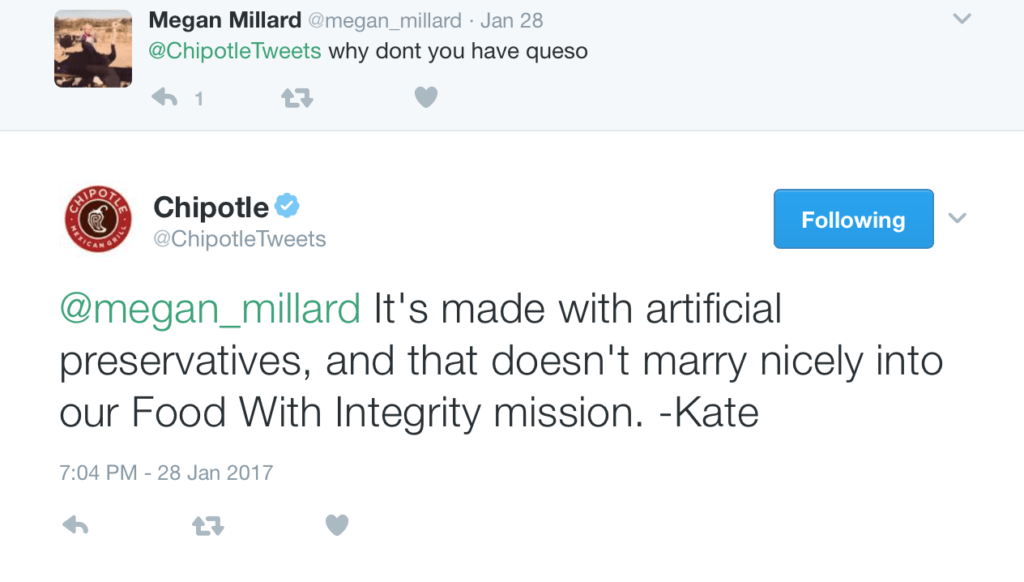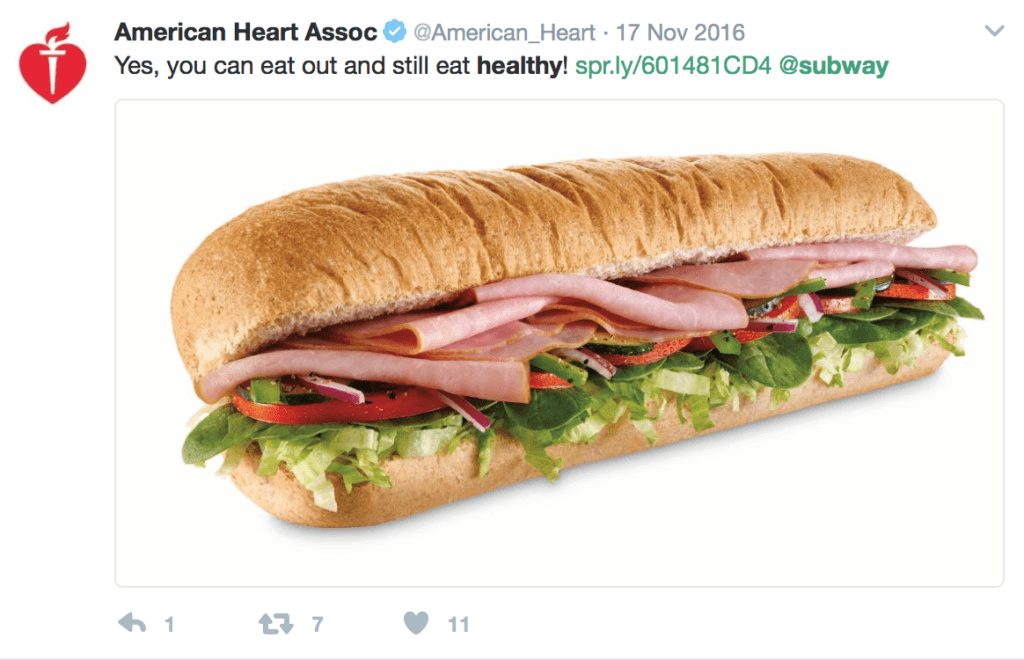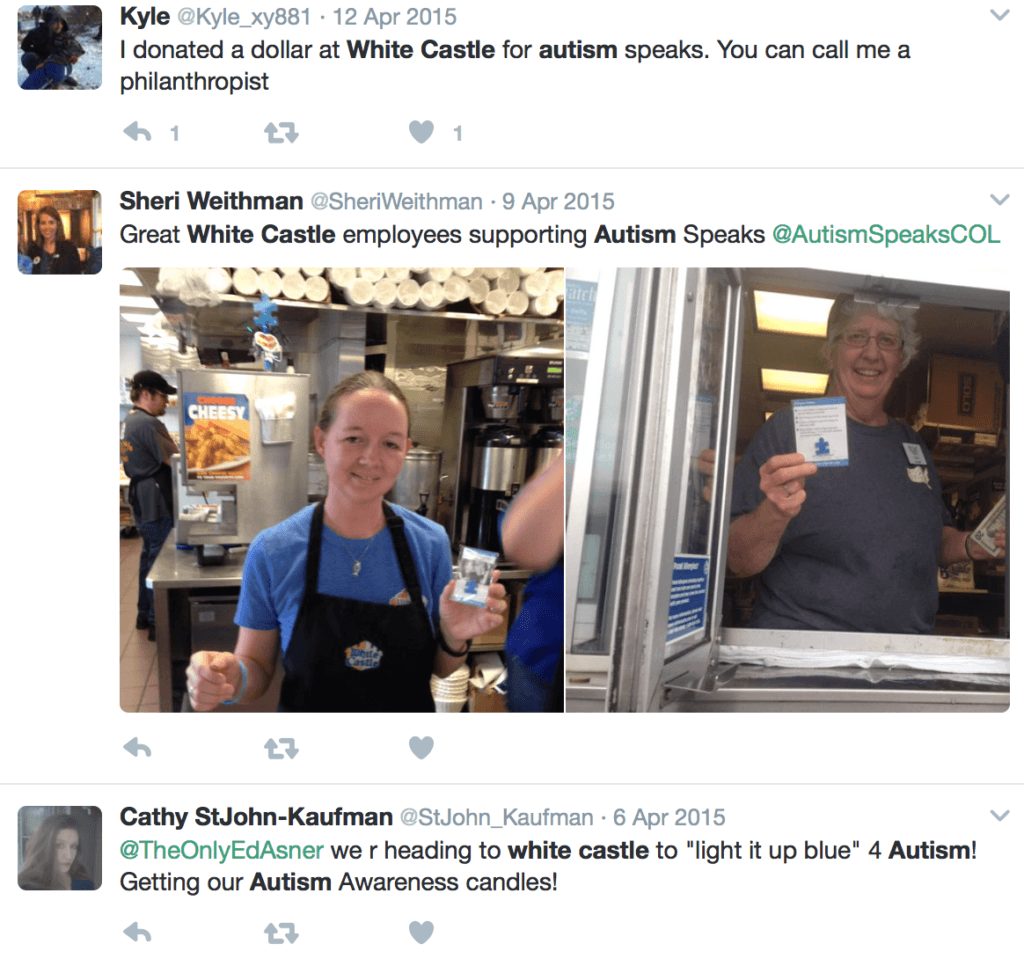From even a cursory glance at the restaurant marketplace, it’s evident that Cause Marketing has become an integral part of the restaurant business. Even in the worlds of QSR and fast-casual, people crave transparency and wholesomeness.
Cause marketing — the act of aligning a brand with a cause, to produce profitable and societal benefits for both parties — sounds a lot like philanthropy. But it’s actually more of a business strategy, and a solid one at that, with regard to both customers and employees.
Think of cause marketing and corporate social responsibility (CSR) as related but separate, not synonymous. While important on its own, Cause Marketing is even more effective when leveraged with promotional cooperatives and partnerships with community influencers and other aligned organizations. Below are a few solid examples of restaurant chains that utilized cause marketing to their advantage:
1. sweetgreen’s Wasted Salad

In 2015, burgeoning fast-casual chain sweetgreen put its cause right on the menu with a salad comprised entirely of food waste — and asking diners to dig in. Were it any other moment in history — and any other chain — the move might not have worked. The ingredients in the “wastED” salad read like a veritable who’s-who of restaurant kitchen rejects: kale stems, cabbage cores, carrot peels, broccoli stalks, and bread butts. But the end result — a joint venture with renowned chef Dan Barber — was not only tasty, it was charitable. Half of the proceeds of every $8.60 wastED salad went to City Harvest, a food rescue organization devoted to ending hunger.
One challenge of Cause Marketing lies in selecting the right cause in the first place. In the U.S., 43 percent of consumers want to see a company’s charitable efforts impact their community, so selecting a cause with a local presence is a good start. It also helps to keep guests informed. In this case, sweetgreen led by example, lending heavy exposure to the salad campaign on its own social channels and encouraging others to share, as well. Eventually, news of the salad made its way to dozens of high-profile media outlets — proof that Cause Marketing can also pay off in terms of Earned Media.
2. Starbucks’ Partners

At Starbucks, baristas are more than workers — they’re “partners,” a term the coffee chain often uses when touting its employee benefits. Starbucks promises potential employees that working with Starbucks means they are “connected to something bigger,” and “inspiring positive change in the world around us.” It might sound overly flamboyant, but the company’s benefits greatly outweigh those at other food and beverage chains (Starbucks offers tuition reimbursement and health benefits for some employees).
For chains like Starbucks, touting a cause is beneficial on several fronts. Of course, there are the obvious reasons, like giving back to the community. But it also helps cut through the noise, differentiating a brand and improving a company’s reputation. It can even help attract (and keep) employees — which is why so many people who are proud to work for Starbucks likely wouldn’t be as proud to work for McDonald’s. In fact, six out of 10 Millennials cite “a sense of purpose” as part of the reason they chose to work for their current employer.
According to a Starbucks spokesperson, being interviewed by Business Insider back in 2014, the chain accepts only 1% of all applicants, simply because the number of applications it receives is so staggering.
In another stellar use of Cause Marketing, Starbucks teamed up with (RED) – the Global Fund to Fight Aids, donating 10 cents for every hand-crafted drink sold (at participating stores) in the U.S. and Canada. The campaign had a direct impact on sales and benefitted the organization in a big way, with the chain raising $12 million over the past seven years through the partnership.
3. Chipotle’s ‘Food With Integrity’

Studies have shown that social purpose can often be the deciding factor for shoppers globally. When choosing between two brands of equal quality and price, 90% of U.S. shoppers are likely to switch to a cause-branded product. The trend isn’t specific to the U.S., either. Research shows 91% of global consumers are willing to switch brands to support companies tied to a charity. A further 50 percent of consumers across the globe are willing to spend more on a product associated with philanthropy.
Before its massive food safety scandal of 2015, Chipotle had squarely planted itself as the healthy, ethical choice among its peers. The company mission — to serve “food with integrity” — clearly resonated with consumers. While others were still serving up the same stale menus (frozen burgers Chipotle took the decidedly riskier route — slicing fresh avocados for its guacamole, grilling meat in full view of customers, and shunning microwaves in favor of classic cooking techniques. By positioning itself as a fresh alternative to traditional fast food, Chipotle enjoyed rapid growth. In its heyday, the chain was producing double-digit comps over the span of several quarters (comp sales for the third quarter of 2014 jumped nearly 20%).
4. Subway’s Heart-Healthy Menu

In 2012, Subway announced it would be the first restaurant chain to participate in the American Heart Association’s Heart-Check Meal Certification program, in which items that meet a required set of nutritional criteria can display the AHA mark. Even today, Subway’s homepage proudly touts the fact that it was the “first fast food restaurant to earn the American Heart Association Heart Check for heart-healthy meals.”
Of course, the chain still offers foot-long meatball subs, covered in sauce and cheese. But by aligning itself with an organization focused on health, Subway still manages to promote its brand and positioning. The Heart-Check mark works to boost consumer perception and trust, extending a halo of healthfulness (even if the sandwich stamped “heart healthy” isn’t all that healthy to begin with).
5. White Castle Raises Awareness for Autism

To highlight Autism Awareness Month (in April), White Castle has partnered with Autism Speaks since 2010. Customers are encouraged to purchase a puzzle-piece for $1, $3, or $5 to benefit the organization and, since 2010, the burger chain has raised more than $3 million. Additionally, the chain unveiled a limited-edition Original Slider-scented candle, with a portion of sales going to the organization. Since 2010, over 10,000 candles have sold to raise more than $100,000.
Increasing sales is, of course, persuasive. But cause marketing also makes consumers feel good, even when it requires little more than adding a dollar to their grocery bill. According to one study, 72% of consumers have donated to charity at the register and 65% of consumers felt positively about the retailer after giving.
So Why Aren’t More Brands Engaged in Cause Marketing Efforts?
For one thing, effective communication isn’t easy. In fact, surveys have found that 70% of Americans find companies’ communication about their social responsibility efforts confusing.
But equally problematic, especially in the restaurant industry, is that having a cause requires having a personality. And many restaurant chains are sorely lacking in the personality department. And brand personality is a critical component that must be clearly articulated before even attempting to embark on a Cause Marketing effort.
Once elements like brand positioning, brand promise, and brand story are outlined, settling on a charitable partner becomes much easier. People buy brands that reflect how they see themselves in the world. When they’re excited about a cause (and, by extension, a brand), customers will share it — with friends, via social media, etc. Having a brand promise and a brand personality that resonates with your core audience, yields a far greater chance of success than the stale companies who mimic the tactical movements of their competitors.
Put simply, doing good pays off. Many chains are looking for opportunities to be charitable. But in such a crowded marketplace, it’s increasingly difficult for those philanthropic efforts to stand out — all the more reason to have a cause marketing campaign tailored to fit your marketing strategy.
* * *
About Aaron Allen & Associates
Aaron Allen & Associates is a leading global restaurant industry consultancy specializing in growth strategy, marketing, branding, commercial due diligence for emerging restaurant chains and prestigious private equity firms. Aaron has personally lead boots-on-the-ground assignments in 68 countries. Collectively, his clients around the globe generate over $200 billion annually and span six continents and more than 100 countries.
